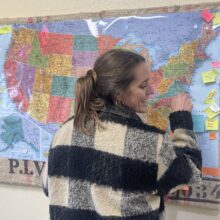Share this story
|
|
Click here for full audio transcription
Cheyenne McNeill: I am Cheyenne, a reporter with EducationNC. Our organization was established to be an independent source of news – providing data, and analysis about education for the people of North Carolina. In short, we tell the stories happening in our state’s classrooms and involving our state’s students.
This story starts in Western North Carolina, with the closing of a paper mill. True to our foundation, we went to the schools to understand the impact of this closing. The closing brought us here, so we want the community to tell the story.
Cheyenne McNeill: On March 6th, Pactiv Evergreen announced it would be closing its paper mill in Canton, North Carolina. The mill, which is estimated to be over 115 years old, has employed generations of Canton residents. Those living and working in the community are left wondering what the next steps are for the mill town – affectionately known as “Papertown.”
Over the years, the paper mill in Canton has changed ownership and endured multiple floods. So we think we should talk about the history of the mill before we even begin discussing the mill’s impending closing.
Well over a century ago, in 1893, the town of Pigeon River in western North Carolina received a new name – Canton.
In 1908 The Champion pulp mill officially opened for production.
From that year until 1999, the company name changed slightly, but the word Champion remained. It is what most people in the town still call the mill, Champion.
The mill has changed hands several times since then, eventually becoming known as Pactiv Evergreen in 2020.
And on Monday, March 6, 2023 the mill that started as Champion and ended as Pactiv Evergreen, announced in an earnings report that the plant would be closing within three months.
As a result, more than 1,000 employees will be laid off by Pactiv Evergreen.
We spoke with Courtney Myers, the lead teacher at North Canton Elementary. She’s lived in Canton her entire life and her husband is a mill worker whose job will be impacted by the Pactiv Evergreen closing.
Courtney Myers: Everything revolves around the mill. You smell it. You hear it. You pass it. You see the stacks. You see the smoke. You see everything. The mill backs up everything. The whistles blow and you hear the trains and you see the smoke, so everything’s centered right there.
Cheyenne McNeill: The mill takes up more than 200 acres of the town. You can drive through the entire site and watch wood chips arrive by train with rail workers moving up and down the tracks. The water treatment system for the town of Canton is housed on the property, sitting on the shores of the Pigeon River. The mill is the centerpiece of the town.
Cheyenne McNeill: Like many others in the community, Myers learned of the mill closing via social media – before her husband even knew.
Courtney Myers: We found out over social media, in the front yard with our children who are now six and four, that he’s gonna lose his job.
Cheyenne McNeill: Myers said initially, all kinds of questions began surfacing.
Courtney Myers: Everybody was worried about how am I going to make my house payment? How am I gonna make my car payment? Where’s my family gonna go?
Cheyenne McNeill: Jill Mann, the principal at North Canton Elementary, says the news of the mill closing only adds to everything the town has been through in the past several years.
She’s referring to the pandemic, and to a cyber attack during the pandemic that shut down the district. But also the flooding of 2021.
We want to note the role of rivers in mill towns. While it traditionally helps fuel the work, it also leaves the structure susceptible to flooding. In 2004, the Pigeon River flooded twice due to Hurricanes Frances and Ivan. This caused close to $50 million in damages to the mill. And in 2021, Tropical Depression Fred unloaded 14 inches in half a day, and about 8 inches fell in three hours at the headwaters of the Pigeon River. This triggered landslides and caused other flash flood events.
Jill Mann: I don’t know that there’s another school system that has had so many things happen to them, that we have and it just seems like everybody comes together, and we get through it every single time. You get over one thing, and then the next wave comes.
Cheyenne McNeill: Trevor Putnam, the superintendent of Haywood County Schools, said this sort of determination and grit is built into the fabric of Canton and Haywood County.
Trevor Putnam: The mill is kind of symbolic of the values of Haywood County. And that means hard work, blue collar, never quit, being there for your neighbor, digging in when things get tough. I feel very strongly that for as long as the people make up this county, in the same way, they have with or without the mill, that fabric of strength and solidarity will continue for as many generations as live here
Cheyenne McNeill: Superintendent Putnam says it’s this toughness and willingness to support the community that has made the mill such a staple in the town. For years, mill workers have supported all kinds of activities and events in the community. Here’s Principal Mann again.
Jill Mann: Every year at Christmas the mill workers take out money, and they buy Christmas for our kids.
Cheyenne McNeill: Principal Mann says mill workers regularly support Christmas shopping for 450 students by contributing $250 per child. Mann – and most others we talked to – distinguish that the mill workers take the initiative to do this. Many workers take monthly contributions out of their checks in preparation for the Christmas and holiday season.
Jill Mann: They go and shop with the kids. They take a day off of work, go to Walmart, buddy up with these children and shop with them. They’re really invested in that.
Cheyenne McNeill: For years, mill workers have also supported the Canton Labor Day festival, thought to be the oldest Labor Day festival in the south. Mill employees and their families gather annually to celebrate the contributions they have made to the county through their work.
Since learning of the closing, Prinicpal Mann has made it a habit to check in with the spouses of mill workers who work at her school. But, she says it hasn’t been easy.
Jill Mann: How do you do this? How do you help somebody who, you know, their husband’s losing their job? Because I don’t know how to help somebody in that situation.
A lot of our kids, even though they don’t show it, a lot of times, you’ll be talking to one of them. and they’ll just look at you and go. Yeah, my dad’s losing their job. What do you say to a seven-year-old? Other than everything’s gonna be okay. And I’m not knowing if it’s gonna be okay.
They look resilient on the outside, but you know, they’re thinking about it, when you’re sitting there talking to him. And all of a sudden they bring that up.
We do everything that we can to try to support, but that’s the way Canton’s always been, they always pitch in and do everything they can and offer all the support, you know, but when the mill closed, it’s like, what kind of support can we offer for that?
I don’t know what to offer people. Because it’s kinda like losing a family member.
Cheyenne McNeill: Like most others in Canton, Myers, Mann, and Putnam aren’t sure what the next steps are for the mill town. Myers said she knows the town will recover – because it always does – but she mourns for her children.
Courtney Myers: Those are the ones that you worry about. We’ll be fine. I know we’ll be fine, but like, I don’t want that for my kids. I don’t want her them to grow up in a mill town without a mill.
Cheyenne McNeill: Principal Mann leans on Canton’s history of persevering through tough times.
Jill Mann: I think it goes back to community. Everybody pulls together no matter what happens. We’ve seen it over and over and our hope and our prayer is that Canton is going to still be Canton and we’re going to still pull together when bad things happen.
Cheyenne McNeill: And Superintendent Putnam believes hope is a choice. He sees the mill closure, and he sees the strength of the people that make up this community.
Trevor Putnam: It’s looking at the glass half full or half empty. And I choose to look at it half full, and an opportunity to fill it. Whatever the end result may be, we’re going to be okay, and we’re going to be Haywood Strong as we were in the floods, and we will be Haywood Strong as we were in economic downturns and plant closures.
Cheyenne McNeill: EdNC is doing a series of stories on what’s happening in Canton. You can find all of our coverage at EdNC.org.
Remaining #HaywoodStrong
On March 6, Pactiv Evergreen announced that it would be closing the paper mill in Canton, North Carolina, located in Haywood County. The mill, which is over 115 years old, is the second-largest employer in the county.
Canton’s mayor, Zeb Smathers, said the mill closed on May 24 – about two weeks earlier than expected.
We spent time in Canton in April, talking with leaders in town and educators in Haywood County Schools. We wanted to know how the mill impacts the town and what the closure will mean.
What we heard repeatedly is that the town is centered around the mill.
We learned that Canton is a community that rallies together.
While no one knows what to expect now that the mill is closing, folks are sure of one thing: Canton will remain #HaywoodStrong.
Listen to the audio story on Spotify here.

Behind the Story
The Power of Papertown is a series of audio stories highlighting the closure of the paper mill in Canton, North Carolina. In this episode, Haywood County Schools employees talk about the mill closure, community support, and resiliency.
Cheyenne McNeill and Caroline Parker did the reporting for this story. Cheyenne produced and narrated the audio story.
In this episode, you heard from Trevor Putnam, Jill Mann, and Courtney Myers – all employees at Haywood County Schools. The intro and outro music was recorded from a session at the Haywood Junior Appalachian Musicians (JAM) after school program.
The artwork for this series was created by Lanie Sorrow.





